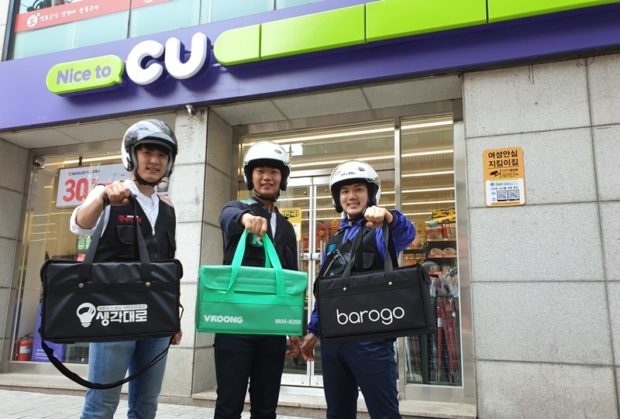SEOUL — Convenience store operators in South Korea are racing to beef up delivery services as a rise in the number of one-person households and the new coronavirus outbreak have raised demand for door-to-door services.
Having an upper hand over major discount stores in terms of consumer accessibility, convenient stores are tapping delivery services as an additional sales channel amid the non-contact trend.
BGF Retail Co., which operates the convenience store chain CU, introduced its delivery service for the first time in the industry in April 2019 after partnering with food delivery app Yogiyo. Currently, about 5,000 CU outlets nationwide provide the service.
In March, BGF Retail also partnered with Naver, the operator of the country’s No. 1 internet portal, to accelerate delivery services.
In May, the number of consumers using its delivery services rose more than tenfold compared with the previous year, according to data provided by the company.
In the March-May period, when the country’s new virus cases spiked, the number of such deliveries jumped nearly 60 percent from a year earlier.
“As more companies adopted remote working systems amid the COVID-19 pandemic, people appeared to use our delivery service as they stayed at home longer,” said an official at BGF Retail.
Non-face-to-face consumption has become a trend in South Korea, as the virus outbreak has prompted more people to use online shopping to avoid infection risks.
A rise in the number of one-person households has also boosted demand for food purchases at convenience stores, as people can eat relatively good full meals at affordable prices.
Households consisting of a single member totaled 5.85 million in 2018, accounting for nearly 30 percent of all households in the country, according to the statistics agency.
Other major convenience store chains have been strengthening delivery services in the highly competitive market.
In May, GS Retail Co., which runs convenience store chain GS25, partnered with Kakao Corp., the operator of the country’s top mobile messenger KakaoTalk, to expand the delivery platform.
Last year, the retail business arm of GS Group launched delivery service at around 10 outlets on the Yogiyo platform before starting to provide full services at around 1,200 stores across the nation in March.
Smaller rivals 7-Eleven and E-Mart 24 have jumped on the bandwagon to deliver food and daily necessities.
“When I worked at home at the height of the pandemic, I ordered snacks several times. A delivery fee appears reasonable, considering I don’t have to put on clothes and a facial mask and walk to a convenience store,” said a 31-year-old man, surnamed Kang. Yonhap
